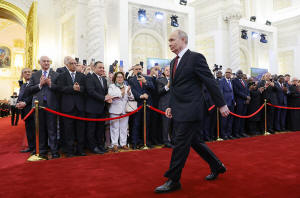Putin sworn in for new term in ceremony boycotted by US
 Send a link to a friend
Send a link to a friend
 [May 07, 2024]
By Guy Faulconbridge and Mark Trevelyan [May 07, 2024]
By Guy Faulconbridge and Mark Trevelyan
MOSCOW (Reuters) -President Vladimir Putin was sworn in for a new
six-year term on Tuesday at a Kremlin ceremony that was boycotted by the
United States and other Western countries at which he said he was
potentially open to nuclear talks with the West.
Putin, in power as president or prime minister since 1999, begins his
new mandate more than two years after he sent tens of thousands of
troops into Ukraine, where Russian forces have regained the initiative
after a series of reversals and are seeking to advance further in the
east.
At 71, Putin dominates the domestic political landscape. On the
international stage, he is locked in a confrontation with Western
countries he accuses of using Ukraine as a vehicle to try to defeat and
dismember Russia.
Putin told Russia's political elite after being sworn in that he was not
shutting down dialogue with the West but that it would have to make its
own choice about how to engage with his country.
He said talks on strategic nuclear stability with the West were also
possible, but only on equal terms.
"We are a united and great people and together we will overcome all
obstacles, we will bring to life everything we have planned. Together we
will be victorious," Putin said.
Putin in March won a landslide victory in a tightly controlled election
from which two anti-war candidates were barred on technical grounds.

His best known opponent, Alexei Navalny, died suddenly in an Arctic
penal colony a month earlier, and other leading critics are in jail or
have been forced to flee abroad.
The United States, which said it did not consider his re-election free
and fair, stayed away from Tuesday's inauguration ceremony.
Britain, Canada and most European Union nations also decided to boycott
the swearing-in, but France said it would send its ambassador.
Ukraine said the event sought to create "the illusion of legality for
the nearly lifelong stay in power of a person who has turned the Russian
Federation into an aggressor state and the ruling regime into a
dictatorship".
Sergei Chemezov, a close Putin ally, told Reuters before the ceremony,
that Putin brought stability, something which even his critics should
welcome.
"For Russia, this is the continuation of our path, this is stability –
you can ask any citizen on the street," Chemezov said.
[to top of second column]
|

Russian President Vladimir Putin walks before his inauguration
ceremony at the Kremlin in Moscow, Russia May 7, 2024. Sputnik/Artyom
Geodakyan/Pool via REUTERS

"President Putin was re-elected and will continue the path, although
the West probably doesn’t like it. But they will understand that
Putin is stability for Russia rather than some sort of new person
who came with new policies – either cooperation or confrontation
even."
NUCLEAR TENSIONS
Russia's relations with the United States and its allies are at
their lowest point since the Cuban Missile Crisis of 1962, when the
world came to the brink of nuclear war.
The West has provided Ukraine with artillery, tanks and long-range
missiles, but NATO troops have not joined the conflict directly,
something that both Putin and President Joe Biden have warned could
lead to World War Three.
Underscoring the rise in nuclear tensions, Russia said on Monday it
would practice the deployment of tactical nuclear weapons as part of
a military exercise, after what it said were threats from France,
Britain and the United States.
"We hope that this event will cool down the 'hotheads' in Western
capitals," the Russian Foreign Ministry said.
One of the decisions awaiting Putin in his new term will be whether
to seek to renew or replace the last remaining treaty that limits
Russian and U.S. strategic nuclear warheads. The New START agreement
is due to expire in 2026.
It remains unclear how far he will seek to press his war in Ukraine
- a decision that will depend in part on whether Joe Biden or Donald
Trump wins the U.S. presidential election in November.
In line with the constitution, the government of Prime Minister
Mikhail Mishustin resigned at the start of the new presidential
term. Putin will appoint a new one which is expected to include many
of the same faces.
(Reporting by Guy Faulconbridge in Moscow and Mark Trevelyan in
London;Editing by Andrew Osborn and Alison Williams)
[© 2024 Thomson Reuters. All rights reserved.]This material
may not be published, broadcast, rewritten or redistributed.
Thompson Reuters is solely responsible for this content.
 |